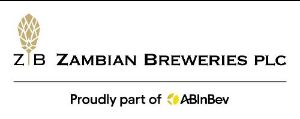
FOR IMMEDIATE RELEASE
WITH PICTURE
SEPTEMBER 12, 2025
Navigating Zambia’s Beer Industry in a Shifting Economy

By Thais Cavinatto
LUSAKA, ZAMBIA – Zambia’s beer industry is more than a cultural fixture—it is an economic engine. At a time when the country is restructuring debt, revitalising mining, and opening new trade routes, beer has quietly proven to be one of the most resilient and adaptable industries, creating jobs, sustaining agriculture, and driving growth across the economy.
At the centre of this story is Zambian Breweries, whose impact stretches well beyond our production plants. We source barley, sorghum, cassava, and maize from thousands of small-scale farmers. By buying locally, we put money directly into rural households, stabilise our supply chains, and create markets for crops that might otherwise struggle to find value. From seed to sip, beer supports a vast ecosystem—shopkeepers, truck drivers, bar staff, and restaurateurs all depend on this industry.
Mining revival, consumer growth
The government’s ambition to triple copper production to three million tonnes by 2030 is more than a mining story. It is about people: more jobs in mining towns, higher incomes, and stronger consumer demand. When mining grows, disposable incomes rise, and with them spending on leisure products like beer. This effect multiplies through hospitality, retail, and services, creating growth cycles where each sector fuels the next.
Opening regional markets
The Lobito Corridor, linking Zambia to Angola’s Atlantic coast, is a strategic opening to regional trade. Though geopolitical challenges remain, its long-term potential is undeniable. For the beer industry, it offers the chance to expand into Southern African markets, diversify customers, and reduce reliance on domestic consumption. Regional growth would mean more stability for the industry and greater opportunities for Zambian businesses connected to it.
Hospitality and retail as growth engines
At home, two sectors are especially important for the future of beer: hospitality and retail. As tourism rebounds, new hotels, restaurants, and bars are multiplying the outlets for locally brewed beverages. Meanwhile, Zambia’s expanding retail network—both modern supermarkets and informal kiosks—has made beer more accessible to more people. Together, these channels connect the industry directly to consumers and will remain critical growth engines.
Shared responsibility
But the path forward is not automatic. Sustained growth requires collaboration across government, business, and communities.
- Policymakers must ensure that regulation supports investment, trade, and infrastructure.
- Breweries must continue innovating—through greener production, smarter distribution, and stronger integration of local supply chains.
- Communities and small businesses should seize the opportunities created, whether through farming partnerships, retailing, or hospitality services.
When these elements align, the benefits are far-reaching: more farmers integrated into supply chains, more jobs in shops and restaurants, and stronger skills in logistics, management, and customer service. In short—greater economic inclusion.
Beer, tax policy, and sustainable growth
The lesson is simple: when the beer industry grows, Zambia grows. But that growth depends on the right policy environment.
Recent increases in excise tax have placed the sector under strain. Higher taxes don’t just affect brewers—they filter down to farmers, retailers, and consumers. Evidence from Zambia and the wider region shows that steep excise hikes often backfire: they shrink the formal market, encourage illicit alcohol trade, and ultimately reduce the very tax revenues government seeks to increase.
In contrast, when excise tax rates were previously set at sustainable levels, the industry expanded, formal sales grew, and government revenues increased year on year. Today, reverting to those earlier excise rates would deliver the same effect: stabilising the market, safeguarding thousands of direct and indirect jobs, and protecting the incomes of smallholder farmers who supply the industry.
Lower, predictable taxation would also strengthen Zambia’s regional competitiveness. Breweries would have more capacity to invest in innovation, expand distribution, and capture export opportunities in neighbouring markets. For government, this would mean not only healthier tax collections from a growing formal industry, but also stronger progress toward national development goals.
A call to action
The beer industry has shown it can be a driver of jobs, farming opportunities, and growth across Zambia. With the right policies, it can do even more. Reverting to the previous excise tax rates is not about favouring one industry—it is about securing inclusive economic growth, protecting livelihoods, and keeping Zambia competitive in the region.
The choice is clear: we can nurture an industry that delivers prosperity from farms to towns to export corridors, or risk undermining its potential. The time to act is now.
Thais Cavinatto is Country Director of Zambian Breweries.
-Ends-
About Zambian Breweries
Zambian Breweries Plc is part of Anheuser-Busch InBev (AB InBev), the largest brewer in the world, with more than 500 beer brands and some 200,000 employees in over 50 countries. It is also one of the world’s largest bottlers of soft drinks.
Zambian Breweries was established in Zambia in 1968 and its product range has grown to include clear beers such as Mosi Premium Lager, Mosi Light, Castle, Carling Black Label, Eagle, Stella Artois, and Budweiser.
For media inquiries please contact
Gillian Langmead at Langmead & Baker Ltd
+260 979 060705
info@langmead.com

